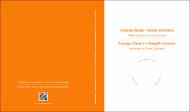Mimar Sinan Güzel Sanatlar Üniversitesi Açık Bilim, Sanat Arşivi
Açık Bilim, Sanat Arşivi, Mimar Sinan Güzel Sanatlar Üniversitesi tarafından doğrudan ve dolaylı olarak yayınlanan; kitap, makale, tez, bildiri, rapor gibi tüm akademik kaynakları uluslararası standartlarda dijital ortamda depolar, Üniversitenin akademik performansını izlemeye aracılık eder, kaynakları uzun süreli saklar ve yayınların etkisini artırmak için telif haklarına uygun olarak Açık Erişime sunar.MSGSÜ'de Ara
Inclusive design + social innovation: a methodology and case studies = Kapsayıcı tasarım + sosyal inovasyon: metodoloji ve örnek çalışmalar

Erişim
© Mimar Sinan Güzel Sanatlar ÜniversitesiTarih
2021Yazar
Editors/Editörler: Abdüsselam Selami Çifter, Hua Dong, Sharon Cook, İnci Olgun ; Graphic design/Grafik tasarım: Serim Dinç ; Cover illustrations/Kapak illüstrasyonları: A. Selami Çifter
Üst veri
Tüm öğe kaydını gösterÖzet
Design contributes to social innovation due to its potential to frame and solve
complex problems. However, because of the multi-dimensional nature of the
problems that the world encounters today, designers require to collaborate with
various stakeholders and develop new skills to trigger, support or manage social
innovation. In this respect, inclusivity is an important phenomenon to focus on,
because designers’ responsibility is to provide equity that results in social integrity
through the participation of diverse communities within the society. Therefore,
today’s design inevitably requires more collaborations to build capacity to respond
to future challenges effectively. This also puts emphasis on design education, which
requires new approaches to educate responsible designers of the future.
With these intentions, “Sustaining inclusive design collaborations through co-design
platforms (SIDe programme)” has been carried out in collaboration with the School
of Design and Creative Arts of Loughborough University (UK) and the Faculty of
Architecture of Mimar Sinan Fine Arts University (TR). The project is supported by
the British Council through Newton Fund, Research Environment Links UK-Turkey
Programme, and aims to create a mechanism which will support collaborations
on inclusive design research and education that can be carried out sustainably.
It covers stakeholders from many different areas, including non-governmental
organisations, policymakers, local governments, private sectors, design educators
and students. The project objectives included:
To increase awareness of inclusive design by creating a comprehensive
resource.
To create a collaborative design mechanism and introduce a curriculum
approach for university students to engage with inclusive design.
To develop an online platform to encourage the communication and share of
inclusive design knowledge and good practices.
There are five associate partners of this project from Turkey and the UK; i.e. the
Six Dots Foundation for the Blinds, The Spinal Cord Paralytics Association of
Turkey, FixEd, Cambridge Engineering Design Centre and the Design Research
Society, which cover different types of organisations from education to research,
as well as organisations that work in the disability sector. The project resulted in a
collaboration model between universities and NGOs and a web-platform to build
and sustain effective collaborations, making their process and results visible to
other stakeholders.
This book embodies the unique perspectives of different types of partners involved
in the SIDe project and presents its outcomes. The first four chapters provide
academic perspectives on inclusive design, co-creation, social innovation, and
social responsibility by distinguished authors from four universities, i.e., University of Cambridge, Kingston University London, Brunel University London, and Mimar
Sinan Fine Arts University. Chapter 5-7 focus on the SIDe project, its collaboration
model that links Universities and NGOs for effective partnership on inclusive design
projects through design education, and the reflections of the partners involved with
whom the framework was tested. The last part of the book presents 14 inclusive
design projects, as the design outcome of the SIDe collaboration framework,
which involved 56 design students and four tutors with different backgrounds
(industrial design, interior architecture, architecture, and city and regional planning),
and two partner organisations in Turkey (the Six Dots Foundation for the Blinds
and the Spinal Cord Paralytics Association of Turkey). At the end of this book, a
comprehensive list of resources on inclusive design can be found focussing on
different aspects of inclusive design and accessibility.
As the SIDe project team from the UK and Turkey, we hope this book will provide
a case and method suggestion to build capacity for social innovation through
sustaining effective inclusive design collaborations with different types of
stakeholders and will inspire readers and help raise awareness on the importance of
inclusive design spanning different scales.
Seri ve Seri No
Mimar Sinan Güzel Sanatlar Üniversitesi Yayınları: 891Koleksiyonlar
- Kitaplar [961]
İlgili Öğeler
Başlık, yazar, küratör ve konuya göre gösterilen ilgili öğeler.
-
20. yüzyılın ilk yarısında konut sorununun ele alınış yöntemleri ve Henri Prost İstanbul örneği
Coşkun, Hülya (Mimar Sinan Güzel Sanatlar Üniversitesi, Fen Bilimleri Enstitüsü, 2017)Bu araştırma, 20. yüzyılın ilk yarısında, Cumhuriyet Türkiye'sinde erken dönemde başlayan çağdaşlaşma projesinin en önemli birkaç örneğinden biri olan İstanbul'un Henri Prost planlamasını genel konu almıştır. Genelde, H. ... -
Mimari tasarım stüdyosunda işlemsel tasarım ve ekoloji tabanlı bir yaklaşım örneği
Karadağ, Derya (Mimar Sinan Güzel Sanatlar Üniversitesi, Fen Bilimleri Enstitüsü, 2018)Mimarlık mesleğinin tarihsel süreçteki gelişimini üç ana eksen üzerinden okuyabilmekteyiz; insan ve toplumun ihtiyaçlarından kaynaklanan tasarım problemine üretilen çözüm ve uygulamalar, mimarlık düşüncesindeki dönüşümlerin ... -
Mobil ortamda 3D eskiz programlarının erken tasarım evresinde kullanımının mimarlık öğrencilerinin bilişsel aktivitelerine etkisi
Cengiz, Simla (Mimar Sinan Güzel Sanatlar Üniversitesi, 2021)Tasarımcılar, erken tasarım evresinde fikirlerini aktarabilmek için geleneksel ortamda araç olarak eskiz yöntemini kullanırlar. Günümüzde gelişen bilgisayar teknolojleriyle beraber, fikrin kağıt yerine sayısal tabanlı ...














